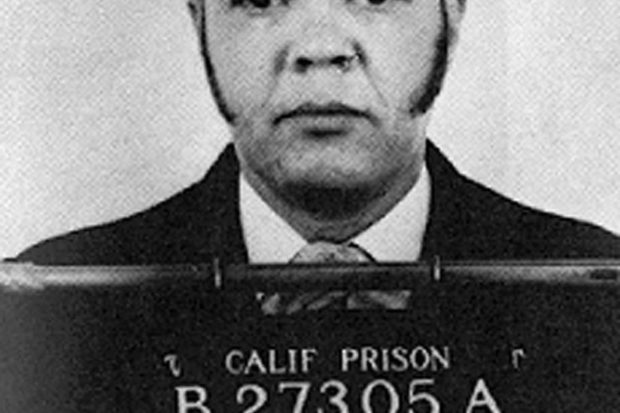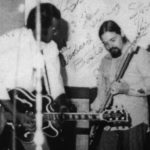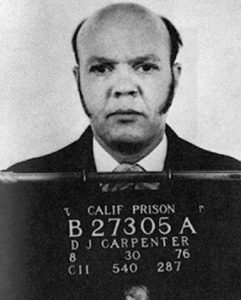
By Boston Woodard
Editor’s note: This extraordinary interview of David Carpenter by prisoner/journalist Boston Woodard is remarkable, not only for its insight into this fascinating and ongoing story but also because of how difficult it is for the media even to talk to prisoners. It is virtually impossible to set up an appointment to speak with and interview any prisoner in California, let alone someone on Death Row. If you didn’t know better, you would think the CDCR did not want you to know what was going on inside the state prison system.


David Joseph Carpenter, 83, is one of the best-known prisoners on San Quentin’s Death Row. Since his conviction as the Trailside Killer three decades ago, he spends the better part of everyday writing letters and working on his complex legal case.
Carpenter, born in San Francisco on May 6, 1930, was convicted of 10 homicides committed in the late l970s and early 1980s.
“There are many [court] cases to research, and staying up with laws pertaining to my case is essential to my ongoing appeal,” said Carpenter. During the 30-minute interview, Carpenter picked up a long, handwritten letter from his bunk. “This letter is for my sister who will be 79 years old this year. We are very close,” he said.
Sitting at the end of his bunk, speaking through the heavily meshed screen covering the bars on his cell door, Carpenter said that he is a devout Catholic. He attends a service every week in the East Block section of Death Row. Carpenter said he has a great relationship with San Quentin’s priest Father George Williams and enjoys conversations with him often.
According to Father Williams, Carpenter “is a very devout, well-informed Catholic who attends all services provided to the men on his yard on Death Row. He is well liked by many of the guys and those who are in contact with him.”
“A few friends come to visit me, and I am extremely grateful to them,” Carpenter said. He receives visits about once a month. When he is not working on his legal case or writing letters, his favorite television stations are ABC’s Channel 7 and KQED Channel 9. He listens to both 1050 and 1140 AM Bay Area sports radio stations for daily updates on his favorite teams.
Carpenter is the oldest man on San Quentin’s Death Row and one of the oldest in the country; he has been on Death Row since 1984. “Despite my age. I’m relatively healthy. My medical issues are minor in comparison to others here [on Death Row] and I have them under control,” Carpenter insisted.
Carpenter also insisted that he is innocent of the murders of which he was convicted.
Authorities said Carpenter was the Trailside Killer based on his association with a young student. “They claimed I was the logical suspect. By then, everyone believed I was the Trailside Killer. It began because I was supposed to pick up Heather Scaggs on May 2, 1981, but I did not. That is why I became the logical suspect,” said Carpenter.
According to www.CrimeLibrary.com, “A DNA sample (from a 1979 case) obtained from the evidence was matched to Carpenter through state Department of Justice files. In February 2010, San Francisco police confirmed the match with a recently obtained sample from Carpenter.”
 Carpenter has committed many waking hours to poring over the details of his murder convictions. After 30 years, he said he knows the details by heart. His claims of innocence have been rejected at every level of the judicial system, but that does not stop him from protesting his innocence.
Carpenter has committed many waking hours to poring over the details of his murder convictions. After 30 years, he said he knows the details by heart. His claims of innocence have been rejected at every level of the judicial system, but that does not stop him from protesting his innocence.
The trailside killings involved multiple victims on hiking trails near San Francisco and Santa Cruz.
“I was the logical suspect. Everyone was convinced I was the trailside killer long before I was charged with any of those murders. Even the investigators knew I was innocent.
“I was convicted by the media long before I was even found guilty of a crime,” he said. Carpenter pointed out that some investigators thought he might, in fact, be the Zodiac Killer, who was also active some years before and who was never caught. However, they later dropped that line of inquiry after handwriting and DNA analysis cleared him. Carpenter said this was proof that investigators had it in for him.
At this point during the interview, because of the din of San Quentin’s East Block Condemned Row, to better facilitate the interview, Carpenter scooted closer toward the front of his bunk in the small condemned cell to be heard more clearly.
Carpenter, who has a pronounced speech impediment, accommodated the interviewer, who sat cross-legged in front of his cell, #1-EB-l 14L, on San Quentin’s Death Row, at midday on June 18, 2013.
He was unyielding while making his argument about not being the “monster” as painted by the media. “For weeks, newspapers published stories about me, the supposed Trailside Killer,” said Carpenter.
On July 6, 1984, in Los Angeles County Carpenter was convicted of first-degree murder. The penalty phase jury found multiple “special circumstances” that warranted the death penalty.
Carpenter’s second trial involving a second group of victims began in San Diego in January 1988. In his Los Angeles trial, few witnesses were called to testify in his defense. Carpenter’s witness list had swelled to more than 30 in the San Diego trial.
Carpenter disagrees with accounts that he had no alibi during some of the murders. “Investigators said that if I did not have an alibi, then I must to be guilty. I produced credible alibis and they knew it. But even where there wasn’t an alibi, that does not make someone guilty.”
Prosecutors assert that Carpenter “offered carefully constructed alibis,” concluding that he had either “altered or that he’s been mistaken about some of the dates.” Carpenter said that prosecutors’ accounts of his alibis were “carefully twisted to sway the jury into believing my alibis were false.”
Carpenter himself took the stand, but in May that same year, he was convicted of five more murders. Just as the Los Angeles jury had done, the San Diego jury also recommended the death penalty.
His mantra is, “prosecutorial misconduct” or abuses by law enforcement.
Carpenter’s defense team, he said, “discovered that [the] jury forewoman, Barbara Durham, revealed she lied under oath” of her knowledge about Carpenter’s convictions in Los Angeles in 1984 for the Santa Cruz murders, a fact that he said prosecutors were aware of beforehand. A new trial was ordered by Appeals Court Judge Herbert Hoffman who said that, by law, he “had to order a new trial.”
The state Supreme Court, however, upheld the death penalty on two of the killings in 1997 and upheld Carpenter’s death penalty from his second trial in 1999. Six of seven judges agreed that Carpenter had a fair trial for the Marin County and Santa Cruz murders and had been sentenced appropriately.
On March 6, 1995, Carpenter was denied a new trial by the California Supreme Court in San Francisco, overturning Judge Hoffman’s order for a new trial. Justice Armand Arabian said it was “virtually impossible to keep secrets in such cases,” and he “believed that the forewoman’s knowledge had not unduly biased the jury.”
With just a few minutes left for the interview, Carpenter said he could not go into any further details due to his ongoing appeal and the advice of his attorneys.
To close the interview, Carpenter was asked, “If and when authorities ever catch the real Trailside Killer, what do you hope happens to that person?”
Carpenter’s response was, “I hope he gets a fair trial.”
Carpenter remains on Death Row in San Quentin pending the exhaustion of all his appeals, which he suspects might take up to four more years, and possible execution.
San Quentin’s Public Information Officer Lt. Sam Robinson said Carpenter “does what is expected of anyone in prison. Carpenter has been very compliant during the time he has spent on Death Row. He has not been a problem.”
Since 1978, according to the California Department of Corrections and Rehabilitation (CDCR), 59 condemned prisoners in California have died from natural causes, 22 have committed suicide and 13 have been executed. There are 725 prisoners on Death Row in California. The last state-sanctioned execution carried out in California was in 2006, bringing the total to 13, all men.
*****
Boston Woodard is a prisoner/journalist. He writes for the Community Alliance and the San Quentin News, has written for the Soledad Star and edited The Communicator. Boston is the author of Inside the Broken California Prison System, which is available at www.amazon.com. Learn more at www.brokencaliforniaprison.com. Contact him at Boston Woodard, B-88207, 2-N-1O1, S.Q.S.P., San Quentin, CA 94974.

[…] “The Prison Press: Conversation with David Carpenter, aka ‘The Trailside Killer’” (Community Alliance, August 2013), an otherwise informative article regarding a man on death row […]
[…] ‘Trailside Killer’ to 1979 SF murder – February 24, 2010[2] Community Alliance: The Prison Press: Conversation with David Carpenter, aka “The Trailside Killer” – August 1, 2013[3] Deathpenalty.org: San Quentin Prison’s death row — the […]